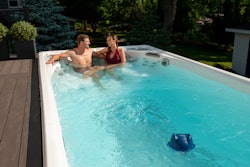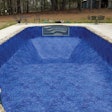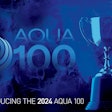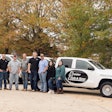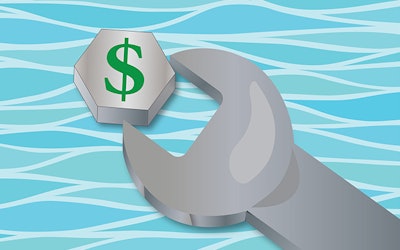
It can be amazing how much difference a single word can make. Case in point: Arizona's Title 44 is a law intended to increase pump efficiency in pools and spas by mandating two-speed or variable speed replacement pumps. But the fine print of the law says it applies only to "new products sold, offered for sale or installed in this state."
When enterprising Arizona pump technicians saw that wording, they realized homeowners could save many hundreds of dollars by avoiding the purchase of an expensive new pump. And thus, practically overnight, a burgeoning pump reconditioning market was born.
According to Perry Lusk, president of Perry's Pool Pumps in Phoenix, "If Title 44 read 'all' products sold instead of 'new' products, it would be a completely different story. A significant part of our business might be very different."
Because Title 44 only applies to new replacement pumps, Lusk's company is able to buy, recondition and resell single-speed motors as an alternative to far more expensive variable speed units.
To ensure he was in full compliance with a law that many find confusing, Lusk made it his business to be absolutely clear what the law means, especially on the point of applicability.
"We did a lot of inquiry into Title 44," he says. "In addition to reading the law very, very carefully, I've had several meetings on the subject with a number of different people, including Arizona Representative Frank Pratt, who was instrumental in pushing Title 44 through. I asked him point blank if I would have to close our doors with this new law. 'No,' he said, 'This law applies only to new products.'"
RELATED: Lawful or Successful
REASONABLE ALLOWANCE
Recognizing an opportunity, Lusk began purchasing old and broken pumps, putting them through a thorough reconditioning process and reselling the refurbished units to both professionals and homeowners at a discounted price.
Lusk estimates that his company turns around more than 4,500 reconditioned pumps each year.
While a robust part of his business, reconditioned pump work is only one part of a steady increase in overall activity at Perry's Pool Pumps that dates back to when Lusk took over the company back in 1994. "We've expanded exponentially and it's certainly not just because of Title 44, although it has helped that part of the business," he explains. "But we have a full retail store, we sell cleaners and hard-to-find parts and most important, we have a lot of experience here. We offer both homeowners and professional far more expertise than what you find at a typical big pool store."
Lusk also makes it clear that he doesn't like to describe the Title 44 language as a "loophole," but instead as a reasonable measure that helps take into account real-life conditions in the pool and spa pump market.
"The entire industry is moving toward greater efficiency, but there are many situations where a variable speed motor is not the right fit," he explains. "You might have an elderly person who's had their pool for 40 years, but when the pump goes down, they either have to fill in their pool or try to pay for an expensive pump they can't afford."
He's quick to point out that none of that is to say he's in any way opposed to variable speed technology. "We have nothing against variable-speed pumps, in fact, quite the opposite," he says. "We sell reconditioned variable-speed pumps and we also offer a variable-speed motor installed onto an existing pump for dramatically less than the cost of an entire assembly, which ultimately does the same thing. It's a third of the cost and the exact same results are achieved without having to cut pipes to remove the existing pump."
Lusk is among those who do believe that in some cases, the efficiencies of variable speed technology have at times been overstated.
"We've all seen the claims that it's a 90 percent savings. They do save energy, but in most situations not to the extent that some manufacturers have claimed.
"A lot of factors come into it. Without going into the math, we estimate that in most situations, a variable speed drive pump will save you 50 to 55 percent, all things being equal."
RELATED: Technically Speaking: Variable-Speed Motors
Those benefits should be balanced against the high price tag and added costs of installation, calibration and programming. "They're also very quiet," he adds, "but that doesn't mean every pool or spa should have one. We're all in favor of energy efficiency, but there are a wide range of reasons why I believe laws such as Title 44 need to take into account more of the possible scenarios."
HIGH AIM
Understanding the intricacies of the market and how Title 44 fits in has, indeed, enabled Lusk to maximize opportunities such as in the reconditioned pump market, but the real key to his company's success has been a culture that is based on experience and quality, he says.
"The product we're putting out is as professional as we can possibly get it," he explains. "The motors are turn apart, blown out and reinsulated with Class F insulation. Factories put Class B insulation in the original motors, so it's a higher grade of insulation. We use a high-potential meter to test the motor windings. That's done three to five times during the rebuilding process. We use ABEC-rated bearings, not motor-rated bearings. All the internal components are sandblasted to remove all the corrosion. They look and run like brand new, down to the labels. There's no reason to expect any less performance and durability than a brand new one."
LegaleseArizona's Title 44 seeks to increase energy efficiency by requiring all new pumps over one horsepower to be multi- or variable-speed. Language with similar intent has been adopted in other states, such as California in its controversial Title 20. The Arizona law states: "Motors with a total horsepower capacity of one or more shall have the capability of operating at two or more speeds with a low speed having a rotation rate that is no more than one-half of the motor's maximum rotation rate and shall be operated with a pump control with the capability of operating the pump at two or more speeds. Residential pool pump motor controls that are sold for use with a two or more speed motor shall have a default circulation speed setting no more than one-half of the motor's maximum rotation rate. Any high speed override capability shall be for a temporary period not to exceed one 24 hour cycle without resetting to the default setting." |























